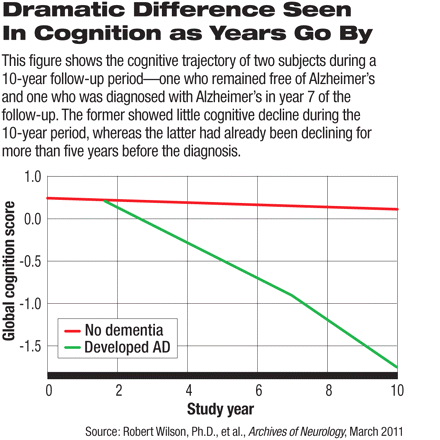Cognition has already declined sharply five to six years before Alzheimer's disease is usually diagnosed.
This is a key finding from a study headed by Robert Wilson, Ph.D., a professor of neuropsychology at Rush University Medical Center in Chicago. The study's senior investigator was David Bennett, M.D., director of the Rush University Alzheimer's Disease Center. Their findings were published in the March Archives of Neurology.
Their study included more than 2,000 subjects. At baseline, the subjects had an average age of 77 and did not have Alzheimer's or any other kind of dementia, according to results of a structured clinical evaluation. That evaluation included a medical history, complete neurological examination, and cognitive-performance testing. The subjects underwent an identical structured clinical evaluation each year after that until they died or until termination of the study 16 years later. The subjects were followed up for an average of seven years.
During the follow-up period, 462 of the participants were diagnosed with Alzheimer's disease. Thus the investigators were able to examine the clinical evaluation results from previous years for these 462 individuals and to determine the state of their cognition prior to their Alzheimer's diagnosis. (Twenty subjects who developed types of dementia other than Alzheimer's were excluded from the analysis.)
Five to six years before their Alzheimer's diagnosis, the cognitive abilities of these 462 individuals had already started declining, the researchers found. Specifically, the results of these individuals' annual cognitive examinations showed that, on average, their semantic memory started deteriorating at 76 months before diagnosis, their working memory at 75 months, their perceptual speed at 70 months, their visuospatial ability at 65 months, and their episodic memory at 63 months.
Moreover, the downward spiraling of these individuals' cognition from baseline to diagnosis was dramatic, having accelerated 15-fold. In contrast, study subjects who did not develop Alzheimer's during the follow-up period evidenced little decline in cognitive function.
"These data show that by the time individuals meet clinical criteria for a diagnosis of Alzheimer's, they have already experienced many years of accelerating cognitive decline," the researchers stated in their report. The data also show, they said, that while certain types of cognition start eroding earlier than others, "cognition is clearly globally affected in the prodromal phase of Alzheimer's."
These findings have "important public-health implications," they concluded, "because it is generally assumed that treatments for Alzheimer's will be more effective if introduced before this prodromal period begins and cognitive systems are manifestly dysfunctional."
The study was funded by the National Institute on Aging and the Illinois Department of Public Health.

